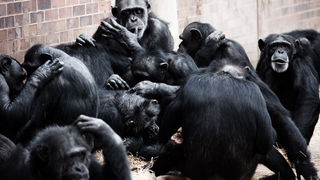Intelligence
Could a Million Monkeys Type the Secret of Life?
Life's special place in the great scheme of existence
Posted May 20, 2016
By Robert Lanza and Bob Berman

The standard explanation of the cosmos, recited in schools globally, involves a Big Bang followed by nature's four fundamental forces fashioning their magic upon matter. It’s presented as a self-operating machine composed of stupid stuff, meaning atoms of hydrogen and other elements that have no innate intelligence. The random laws of chance produced everything we observe. Atoms slammed into others. Billions of lifeless years passed with the cosmos set on "automatic," until on at least one planet life began.
This is the story. Everyone has heard it. And yet everyone can feel how empty and unsatisfying is this narrative. But we cannot fathom how lumps of carbon, drops of water, or atoms of insensate hydrogen ever acquired a sense of smell.
According to this view of the universe, we’re afterthoughts. Accidents, if truth be told. The arising of life is as inconsequential to the cosmos as the fact of Saturn's rings. We’re hardly central or necessary in the cosmic timeline.
We're supposed to exist because of random collisions of matter.
We're all familiar with "the law of averages." We know that if you flip a coin ten times, the most likely result will be five heads and five tails. But we wouldn't be amazed if instead we got seven heads and three tails. Therefore in a single trial it would raise no eyebrows if heads showed up 70% of the time. If we took a statistics course in college, we'll also recall that a large sample size or "n" makes this "law" start to truly appear so magical as to be almost carved in stone. Thus, if we flipped a coin 10,000 times, we could be very confident that heads would not appear 7,000 times, even though this result apparently duplicates the "70% heads" outcome of that first trial. Indeed, getting 7,000 heads would be so bizarre, we'd be wise to distrust the veracity of the coin or the impartiality of the experimenter rather than accept the result.
Statistics, in other words, provides a very trustworthy path when we wish to figure out what's happening. That's why, when subscribers to the "dumb random universe" model (meaning, almost everyone) state that absolutely everything arose by chance, it seems reasonable. Chance also makes it appear plausible that a cosmos as numb and insensate as shale could, given enough time, come up with hummingbirds by randomness alone.
Some version of inherent cosmic intelligence or else creator-deity was assumed for countless centuries; it was the prevailing, almost invariable mindset of scientists. Even as brilliant a thinker as Isaac Newton wrote, near the end of his life, "Whence arises all that Order and Beauty which we see in the world? How came the bodies of animals to be contrived with so much art? Was the eye contrived without skill in optics?"
Or one can turn to Cicero, over two thousand years ago, who wrote, "Why do you insist the universe is not a conscious intelligence, when it gives birth to conscious intelligences?"
So the "smart universe" paradigm prevailed through most of recorded history, either by acknowledging an omniscient puppeteer ‒ God ‒ or by assuming the acumen to be innate, as in "You can't fool Mother Nature." Completely eliminating cosmic intelligence in any form is a rather recent development, even if it is the current science norm.
In any event, the modern dumb universe paradigm requires that we "explain" the complex physical and biological architecture we see all around us by some other means. And "chance" is all we have. Accident. The dumb universe model sinks or swims on the life raft of randomness.
Randomness is also a central key of evolution, where it works splendidly. Darwin wasn't whistling in the wind with his Natural Selection. It's obvious that giraffes developed long necks because those giraffean predecessors who by chance had received a random mutation for a longer than normal neck had a survival edge when it came to grabbing leaves and fruit from higher branches. Over time ‒ and it doesn't take terribly long ‒ the preferential breeding selection of longer-necked mammals gave them a leg up in the Serengeti.
Evolution works, and it's based on random mutations coupled with natural selection. This being so, the science community is happy that the public lazily considers "chance" applicable to everything else we see, too. This includes the entire universe and the arising of life and consciousness.
Natural selection works because some random mutation conferred an advantage that let the animal better survive to procreate. But an eye ‒ any eye, even the earliest ones ‒ required not just a single mutation that created a light-sensitive cell, but also a nerve system or some other modality to carry such sensations to a brain or brain precursor so the information could be utilized in some way, such as locomotion toward or away from the light source.
As observers, we assume that random events created most or all of what we see. The cratering pattern on the planet Mercury appears as random as a coyote's markings. And in the quantum world of the tiny, we only understand things probabilistically. While in many areas this works splendidly, "chance" is actually a fascinating process that's often misunderstood.
The most famous illustration of "probability" is the monkeys-and-typewriters thing. We've all heard it. Let a million monkeys type randomly on a million keyboards for a million years, and you'd get all the great works of literature. Would this be true?
About ten years ago some wildlife caretakers actually put out a bunch of typewriters in front of a group of macaques to see what would happen. The animals typed virtually nothing. Instead they threw some of the machines on the ground, used them as toilets, and quickly rendered all of the machines useless. They didn't create any written wisdom whatsoever.
We'll confine the experiment to our minds the way Einstein liked to do in his 'thought experiments.' So could a million diligent monkeys typing for a million years truly create Hamlet? And if one of them wrote "Moby Dick" word for word on her 97 billionth attempt at pounding random keystrokes but then left out the period at the end, would that count?
Believe it or not, such a problem is entirely solvable. Now, keyboards offer a lot of places to push; there are 58 keys even on old-fashioned typewriters. When talking about random events, consider the difficulty of creating merely the 15 opening characters of Moby Dick, "Call me Ishmael" including the appropriate spaces. How many random tries would be needed?
Given 58 possible keys, it would be 58 × 58 × 58 × 58 … 15 times over, which is about 283 trillion trillion attempts. But remember we have a million monkeys working, and let’s say they type 45 words a minute, so the 15 keystrokes that make up the three words take just four seconds. And they never rest or sleep. How much time then, according to probability laws, before one of them finally types, “Call me Ishmael”?
Answer: about 36 trillion years, or roughly 2,600 times the age of the universe.
So a million monkeys typing furiously would never even reproduce one book's single short opening line…or for that matter, the 15-letter phrase “The Secret of Life” Moral: Forget the monkeys-and-typewriters thing. It's bogus.
The real problem with reliance on chance to explain what is otherwise unexplainable, is that it far overstates the power of random events. Since the "random" business is given far more potency both in the popular imagination and among scientists than it deserves, we'd be more likely to make progress by candidly saying, "This is a mystery" ‒ and then researchers might begin to tackle it from scratch with a clean slate.
Accomplishing some particular complex task by mere chance ‒ like the creation of life and consciousness ‒ is what we're examining here. Given the stupendous limitations in what chance can accomplish, we must also understand why ‒ seemingly paradoxically ‒ random events do nonetheless create a dizzying array of possibilities.
Possibilities are always insanely enormous. They surprise us. The number of atoms in the entire visible universe can be written right here: 10 000 000 000 000 000 000 000 000 000 000 000 000 000 000 000 000 000 000 000 000 000 000 000 000 000 000 ‒ that's 80 zeroes. Add just six more zeroes (you'd hardly notice them) and you've represented all the atoms in a million universes.
But you'd have to type zeroes for the rest of your life to express the ways ‒ just the written representation ‒ that stars can be arranged in our galaxy. Or neurons can connect in a human brain. The number of ways things can happen are stupendous. The mind's potential lies beyond its own comprehension.
We can always count things. No problem there. But when it comes to assessing possibilities ‒ on Earth or off it ‒ we monkeys haven't got a chance.
So back to our original question: Can you get the cosmos we see, including the complex biological designs of the brain and the trumpeter swan, through random atom collisions alone? If randomness requires 36 trillion years to type a single fifteen word passage, the answer is obvious: not a chance. On the other hand, if the desired endpoint is not some specific accomplishment like mangoes or the genesis of life, and you're merely asking those colliding billiard balls to come up with something or other, anything at all, it will surely oblige.
This takes us inescapably to considering "chance" as it tries to create some sort of universe. The problem is, our universe has an exquisite set of properties that are Goldilocks-perfect for life to exist. We live in an extraordinarily fine-tuned cosmos. It's a place where any random tweaking that conjured even slightly different parameters in hundreds of independent ways would not do the job of allowing any kind of life to arise. Let gravity be two percent different, or change the power of the Planck length or Boltzmann's constant or the atomic mass unit and you'd never have stars, or life.
So by any stretch of wishful thinking, a cosmos that even allows life ‒ let alone the fact of life's development ‒ is inconceivable by chance alone. Randomness is not a tenable hypothesis. Truth be told, as an explanation it's close to idiotic ‒ right up there with the dog ate my homework. It's almost as if "dumb cosmos" supporters demand their theory's validity to march in sync with its central premise.
And so falls the cornerstone of the current "clarification" of the cosmos. It always seemed a sickly forced explanation that requires little more than a cursory inspection to be demolished.
Of course, even had friendly background conditions and favorable physical constants all come into existence, life and consciousness ‒ according to the modern paradigm ‒ must still duly manage to arise purely by accident. These are not trivial, easily-manufactured items.
Let's sum up the most basic do-or-die physical background conditions for life to spring into existence. First, two specific fundamental forces ‒ electromagnetism and the 'strong force" that operates only in very small spaces ‒ must have specific values. The former permits electrical fields that can keep electrons attached to atomic nuclei, allowing the existence of atoms. But even atomic nuclei won't hold together without a perfectly tuned strong force, since this alone lets multiple protons cling together and overcome the "like-repels-like" nature of electromagnetism. Without multiple protons, the only element that could exist would be hydrogen. And while no one is anti-hydrogen, it alone could not produce any sort of organism even if nature patiently waited eons until the cows came home.
Then you need a third fundamental, the gravitational force, to be not too weak and not too strong or you can't have stars. We could keep going, but suffice to say that up 200 physical parameters must be exactly as they are to within a percentage or two in order for stars to undergo nuclear fusion and create all their nice warmth and sustenance, for planets to form, and for multiple elements to be created. In short, yes, it's a perfect universe ‒ and we haven't even yet gotten to the life-creation process with its own crowded stadium of requirements, such as worlds that are not too hot or cold or radiation-filled, and specific properties of a few key elements like oxygen and carbon that need to exhibit just the characteristics we observe.
Even locally, here on Earth, life would be difficult or impossible if we didn't possess our massive nearby moon. That's because our world's axial tilt would naturally wobble wildly, sometimes aiming straight at the Sun so that it would be overhead for months at a time, producing impossibly hot temperatures. But our planet manages to avoid going through such chaos: Our axis' obliquity is essentially stable, and displays small harmless variations of ± 1.3° around an average of 23.3° ‒ just about where it's aiming today. If the Moon's gravitational torque were absent, the axis would change from nearly zero (meaning, no seasons at all) up to about 85° ‒ meaning, aimed sunward the way poor Uranus does. Thus the Moon regulates our climate, keeping it gentle and relatively consistent over the eons, instead of us periodically having impossible hostile conditions that would have made ice ages seem by comparison like subtle room temperature changes.
And how did we get the moon? The perfectly timed collision of a Mars-sized body coming from a propitious direction and at the correct speed ‒ not too fast or massive to destroy us, and not too small to fail to do the job. Direction matters because unlike all the other major moons of the solar system, ours is the only one that does orbit around its planet's equator. Our moon ignores our axial tilt. If it orbited "normally," it wouldn't always sit in our orbital plane and thus exert its torque in a sun-vector alignment, where it's maximally effective at stabilizing our axis. Another accident.
This is an extremely unlikely universe. So unlikely that even the most die-hard classical, random-believing physicists concede that the cosmos is insanely improbable in terms of life-friendliness. This hyper-unlikely nature, just on a strictly physical level, makes many physicists sigh with discomfort and admit that some sort of scientific explanation is badly needed.
Applying Occam's Razor ‒ that the simplest explanation is usually the correct one ‒ biocentrism offers an obvious alternative explanation for our undeniably improbable life-friendly universe. Namely, it’s life-friendly because reality is a process that involves our consciousness! Duh. In these days of experiment and disconnected theory, one point seems certain: the nature of the universe cannot be divorced from the nature of life itself.
Modified from “Beyond Biocentrism: Rethinking Time, Space, Consciousness, and the Illusion of Death” by Robert Lanza with Bob Berman.




